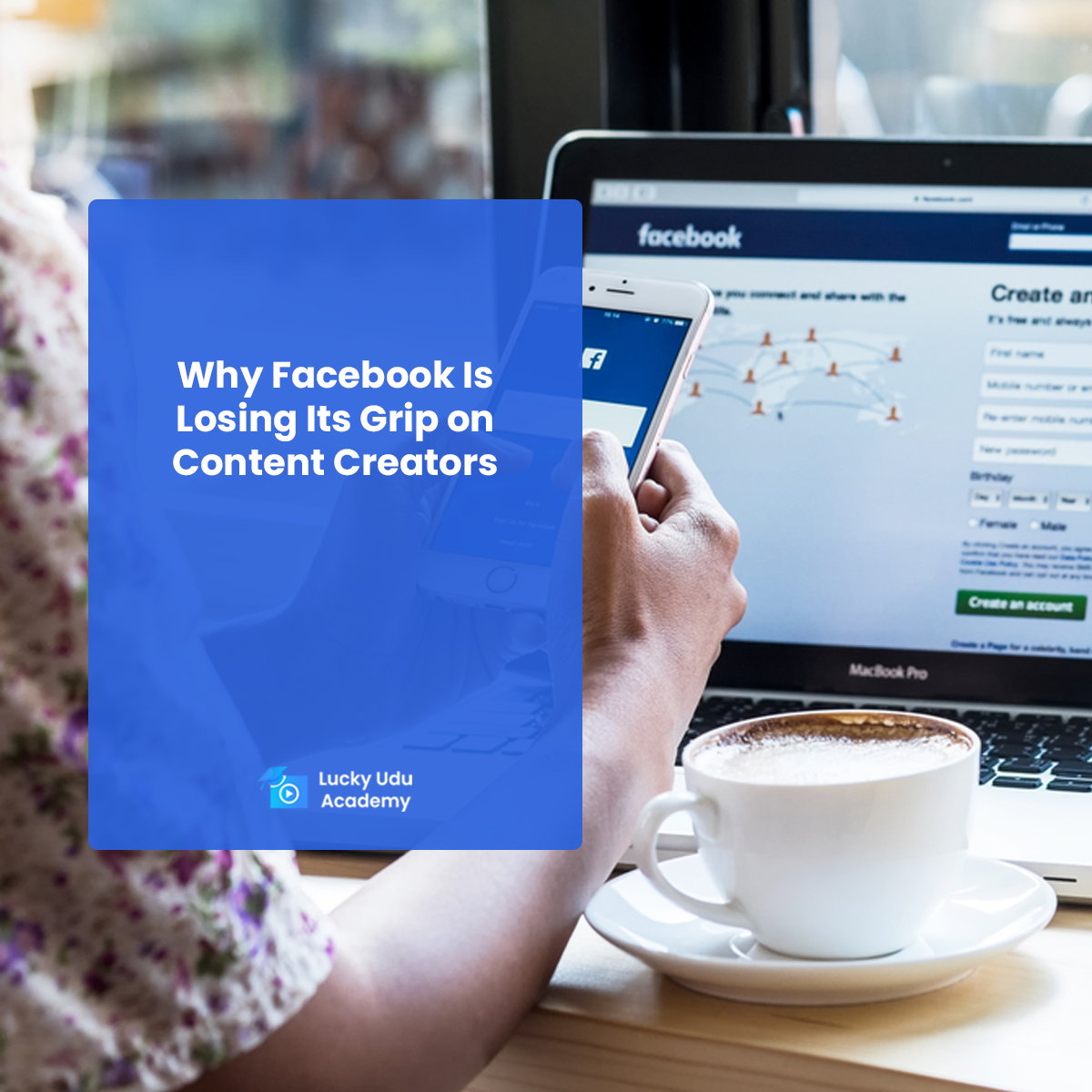Currently Empty: ₦0.00

In recent years, Facebook has been steadily losing its hold on content creators, with many migrating to other platforms like YouTube and TikTok. This shift has raised serious questions about Facebook’s future as a platform for creative work and digital entrepreneurship. But why are creators leaving in droves? The reasons lie in reduced earnings, stricter content guidelines, poor support, and a lack of transparency. Here’s a deep dive into why Facebook is losing its grip on content creators.
- Drastically Reduced Earnings for Creators
One of the most significant reasons creators are leaving Facebook is the drop in earnings. A few years ago, creators could make anywhere from $300 to $1,000 per million views, but recent reports show that creators now earn between $0 and $100 for the same number of views. This dramatic reduction has disincentivized creators from investing their time and resources in the platform.
Comparison to YouTube:
On YouTube, creators can earn significantly more. For example, $1 to $10 per 1,000 views is typical depending on the creator’s niche, location, and audience engagement. For a million views, a creator on YouTube could make anywhere from $1,000 to $10,000. This massive difference in earnings is a major reason why creators are jumping ship.
Example:
A Nigerian documentary filmmaker like Lucky Udu, who tells people’s stories through long-form video content, could earn enough from a few hundred thousand views on YouTube to sustain a growing business. In contrast, the same views on Facebook would offer a fraction of that income, limiting business growth and sustainability.
- Lack of Transparency and Specific Guidelines
Facebook has gained a reputation for being opaque in its communication with creators. When videos are taken down or demonetized, creators are often given vague reasons such as, “This post may go against our guidelines on suggested content.” Common reasons include discussions of self-harm, depictions of violence, or sexually suggestive content. However, Facebook rarely provides specific details on why the video was flagged, leaving creators guessing what went wrong.
No Option to Appeal:
To make matters worse, creators on Facebook are often not given the option to appeal these decisions. Instead, they are left with two choices: delete the post or change the page admin. This lack of clarity and support has left many creators frustrated and disillusioned.
YouTube’s Appeal Process:
In comparison, YouTube provides specific reasons why a video might be flagged and allows creators to appeal the decision. For example, YouTube’s Content ID system allows rights holders to claim videos, but creators have the option to dispute these claims if they believe the content falls under fair use or if they have the necessary permissions. This fairer, more transparent system keeps creators informed and engaged in the platform.
- Stricter Content Guidelines and Rights Management on Facebook
Facebook has implemented stricter content guidelines and an aggressive Rights Manager system that many creators find difficult to navigate. The system has flagged and taken down content for reasons such as minor background music that falls under copyright infringement, even when the usage is incidental or falls under fair use.
Example:
A vlogger might include background music while filming in a public space, not realizing that the song playing in a store will result in a copyright strike on Facebook. Unlike YouTube, where the creator can dispute the claim, Facebook’s system often leaves creators stuck with no way to resolve the issue.
Comparison with YouTube:
YouTube’s Content ID system is far more developed and provides a dispute mechanism where creators can challenge copyright claims. This gives creators more freedom to use third-party content responsibly, such as short clips for commentary, criticism, or parody, without the fear of their videos being unfairly removed.
- Poor Customer Support on Facebook
Customer support is another major area where Facebook is falling short. Creators who encounter issues with their videos, whether it’s demonetization or removal, often receive little to no assistance from Facebook’s support team. In contrast, YouTube, while not perfect, offers YouTube Creator Support, a more accessible and helpful system for resolving issues. YouTube also provides detailed performance reports, helping creators understand their content’s impact and troubleshoot problems with monetization.
Example:
Many creators report submitting tickets to Facebook’s support team, only to be met with automated responses or long delays with no resolution. This is in stark contrast to YouTube’s more structured support system, which may provide specific answers or assign a human representative to assist.
- Decline in Organic Reach and Engagement on Facebook
Facebook’s algorithms have also undergone changes that have significantly reduced the organic reach of creators’ content. With more emphasis on paid advertising and sponsored posts, creators find it increasingly difficult to get their content seen by their followers without spending money to boost their posts. This decrease in organic engagement has affected creators’ ability to grow their audiences naturally.
YouTube’s Algorithm:
While YouTube’s algorithm can also be challenging, it is known for its potential to recommend content to new viewers through its search and recommended video features. This makes it easier for creators to reach new audiences based on the quality and relevance of their content, rather than relying on paid promotion.
Example:
A creator who uploads a high-quality, in-depth tutorial on YouTube may see it recommended to users searching for similar content, allowing for organic growth. On Facebook, the same creator might struggle to get their post in front of their existing audience without paying for ads.
Conclusion: Facebook’s Decline and YouTube’s Rise
As Facebook continues to implement changes that make it less favorable for content creators, YouTube has emerged as a more supportive platform with better monetization opportunities, clearer guidelines, and fairer content management systems. While Facebook still has a vast user base, its restrictive policies, poor customer support, and reduced earnings are driving creators away. In contrast, YouTube provides a more transparent and lucrative environment for creators to build sustainable careers.
For creators who rely on digital content for their livelihood, the choice is becoming increasingly clear: YouTube is better suited to support long-term success, while Facebook’s changes are making it harder for creators to thrive.


